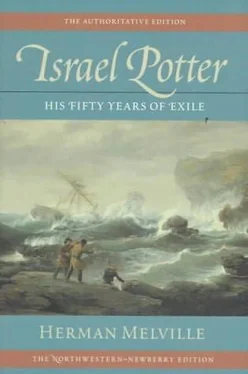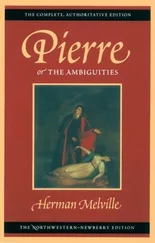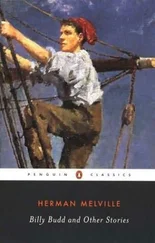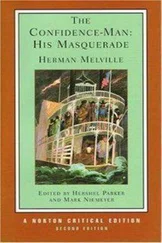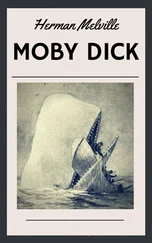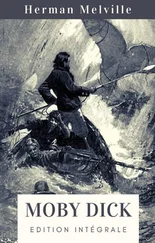Herman Melville - Israel Potter. Fifty Years of Exile
Здесь есть возможность читать онлайн «Herman Melville - Israel Potter. Fifty Years of Exile» весь текст электронной книги совершенно бесплатно (целиком полную версию без сокращений). В некоторых случаях можно слушать аудио, скачать через торрент в формате fb2 и присутствует краткое содержание. Жанр: Классическая проза, на английском языке. Описание произведения, (предисловие) а так же отзывы посетителей доступны на портале библиотеки ЛибКат.
- Название:Israel Potter. Fifty Years of Exile
- Автор:
- Жанр:
- Год:неизвестен
- ISBN:нет данных
- Рейтинг книги:4 / 5. Голосов: 1
-
Избранное:Добавить в избранное
- Отзывы:
-
Ваша оценка:
- 80
- 1
- 2
- 3
- 4
- 5
Israel Potter. Fifty Years of Exile: краткое содержание, описание и аннотация
Предлагаем к чтению аннотацию, описание, краткое содержание или предисловие (зависит от того, что написал сам автор книги «Israel Potter. Fifty Years of Exile»). Если вы не нашли необходимую информацию о книге — напишите в комментариях, мы постараемся отыскать её.
Israel Potter. Fifty Years of Exile — читать онлайн бесплатно полную книгу (весь текст) целиком
Ниже представлен текст книги, разбитый по страницам. Система сохранения места последней прочитанной страницы, позволяет с удобством читать онлайн бесплатно книгу «Israel Potter. Fifty Years of Exile», без необходимости каждый раз заново искать на чём Вы остановились. Поставьте закладку, и сможете в любой момент перейти на страницу, на которой закончили чтение.
Интервал:
Закладка:
The peace immediately filled England, and more especially London, with hordes of disbanded soldiers; thousands of whom, rather than starve, or turn highwaymen (which no few of their comrades did, stopping coaches at times in the most public streets), would work for such a pittance as to bring down the wages of all the laboring classes. Neither was our adventurer the least among the sufferers. Driven out of his previous employ-a sort of porter in a river-side warehouse-by this sudden influx of rivals, destitute, honest men like himself, with the ingenuity of his race, he turned his hand to the village art of chair-bottoming.
An itinerant, he paraded the streets with the cry of "Old chairs to mend!" furnishing a curious illustration of the contradictions of human life; that he who did little but trudge, should be giving cosy seats to all the rest of the world. Meantime, according to another well-known Malthusian enigma in human affairs, his family increased. In all, eleven children were born to him in certain sixpenny garrets in Moorfields. One after the other, ten were buried.
When chair-bottoming would fail, resort was had to match-making. That business being overdone in turn, next came the cutting of old rags, bits of paper, nails, and broken glass. Nor was this the last step. From the gutter he slid to the sewer. The slope was smooth. In poverty-"Facilis descensus Averni."
But many a poor soldier had sloped down there into the boggy canal of Avernus before him. Nay, he had three corporals and a sergeant for company.
But his lot was relieved by two strange things, presently to appear. In 1793 war again broke out, the great French war. This lighted London of some of its superfluous hordes, and lost Israel the subterranean society of his friends, the corporals and sergeant, with whom wandering forlorn through the black kingdoms of mud, he used to spin yarns about sea prisoners in hulks, and listen to stories of the Black Hole of Calcutta; and often would meet other pairs of poor soldiers, perfect strangers, at the more public corners and intersections of sewers-the Charing-Crosses below; one soldier having the other by his remainder button, earnestly discussing the sad prospects of a rise in bread, or the tide; while through the grating of the gutters overhead, the rusty skylights of the realm, came the hoarse rumblings of bakers' carts, with splashes of the flood whereby these unsuspected gnomes of the city lived.
Encouraged by the exodus of the lost tribes of soldiers, Israel returned to chair-bottoming. And it was in frequenting Covent-Garden market, at early morning, for the purchase of his flags, that he experienced one of the strange alleviations hinted of above. That chatting with the ruddy, aproned, hucksterwomen, on whose moist cheeks yet trickled the dew of the dawn on the meadows; that being surrounded by bales of hay, as the raker by cocks and ricks in the field; those glimpses of garden produce, the blood-beets, with the damp earth still tufting the roots; that mere handling of his flags, and bethinking him of whence they must have come, the green hedges through which the wagon that brought them had passed; that trudging home with them as a gleaner with his sheaf of wheat;-all this was inexpressibly grateful. In want and bitterness, pent in, perforce, between dingy walls, he had rural returns of his boyhood's sweeter days among them; and the hardest stones of his solitary heart (made hard by bare endurance alone) would feel the stir of tender but quenchless memories, like the grass of deserted flagging, upsprouting through its closest seams. Sometimes, when incited by some little incident, however trivial in itself, thoughts of home would-either by gradually working and working upon him, or else by an impetuous rush of recollection-overpower him for a time to a sort of hallucination.
Thus was it:-One fair half-day in the July of 1800, by good luck, he was employed, partly out of charity, by one of the keepers, to trim the sward in an oval enclosure within St. James' Park, a little green but a three-minutes' walk along the gravelled way from the brick-besmoked and grimy Old Brewery of the palace which gives its ancient name to the public resort on whose borders it stands. It was a little oval, fenced in with iron pailings, between whose bars the imprisoned verdure peered forth, as some wild captive creature of the woods from its cage. And alien Israel there-at times staring dreamily about him-seemed like some amazed runaway steer, or trespassing Pequod Indian, impounded on the shores of Narraganset Bay, long ago; and back to New England our exile was called in his soul. For still working, and thinking of home; and thinking of home, and working amid the verdant quietude of this little oasis, one rapt thought begat another, till at last his mind settled intensely, and yet half humorously, upon the image of Old Huckleberry, his mother's favorite old pillion horse; and, ere long, hearing a sudden scraping noise (some hob-shoe without, against the iron pailing), he insanely took it to be Old Huckleberry in his stall, hailing him (Israel) with his shod fore-foot clattering against the planks-his customary trick when hungry-and so, down goes Israel's hook, and with a tuft of white clover, impulsively snatched, he hurries away a few paces in obedience to the imaginary summons. But soon stopping midway, and forlornly gazing round at the enclosure, he bethought him that a far different oval, the great oval of the ocean, must be crossed ere his crazy errand could be done; and even then, Old Huckleberry would be found long surfeited with clover, since, doubtless, being dead many a summer, he must be buried beneath it. And many years after, in a far different part of the town, and in far less winsome weather too, passing with his bundle of flags through Red-Cross street, towards Barbican, in a fog so dense that the dimmed and massed blocks of houses, exaggerated by the loom, seemed shadowy ranges on ranges of midnight hills, he heard a confused pastoral sort of sounds-tramplings, lowings, halloos-and was suddenly called to by a voice to head off certain cattle, bound to Smithfield, bewildered and unruly in the fog.
Next instant he saw the white face-white as an orange-blossom-of a black-bodied steer, in advance of the drove, gleaming ghost-like through the vapors; and presently, forgetting his limp, with rapid shout and gesture, he was more eager, even than the troubled farmers, their owners, in driving the riotous cattle back into Barbican. Monomaniac reminiscences were in him-"To the right, to the right!" he shouted, as, arrived at the street corner, the farmers beat the drove to the left, towards Smithfield: "To the right! you are driving them back to the pastures-to the right! that way lies the barn-yard!" "Barn-yard?" cried a voice; "you are dreaming, old man." And so, Israel, now an old man, was bewitched by the mirage of vapors; he had dreamed himself home into the mists of the Housatonic mountains; ruddy boy on the upland pastures again. But how different the flat, apathetic, dead, London fog now seemed from those agile mists which, goat-like, climbed the purple peaks, or in routed armies of phantoms, broke down, pell-mell, dispersed in flight upon the plain, leaving the cattle-boy loftily alone, clear-cut as a balloon against the sky.
In 1817 he once more endured extremity; this second peace again drifting its discharged soldiers on London, so that all kinds of labor were overstocked. Beggars, too, lighted on the walks like locusts.
Timber-toed cripples stilted along, numerous as French peasants in sabots. And, as thirty years before, on all sides, the exile had heard the supplicatory cry, not addressed to him, "An honorable scar, your honor, received at Bunker Hill, or Saratoga, or Trenton, fighting for his most gracious Majesty, King George!" so now, in presence of the still surviving Israel, our Wandering Jew, the amended cry was anew taken up, by a succeeding generation of unfortunates, "An honorable scar, your honor, received at Corunna, or at Waterloo, or at Trafalgar!"
Читать дальшеИнтервал:
Закладка:
Похожие книги на «Israel Potter. Fifty Years of Exile»
Представляем Вашему вниманию похожие книги на «Israel Potter. Fifty Years of Exile» списком для выбора. Мы отобрали схожую по названию и смыслу литературу в надежде предоставить читателям больше вариантов отыскать новые, интересные, ещё непрочитанные произведения.
Обсуждение, отзывы о книге «Israel Potter. Fifty Years of Exile» и просто собственные мнения читателей. Оставьте ваши комментарии, напишите, что Вы думаете о произведении, его смысле или главных героях. Укажите что конкретно понравилось, а что нет, и почему Вы так считаете.
